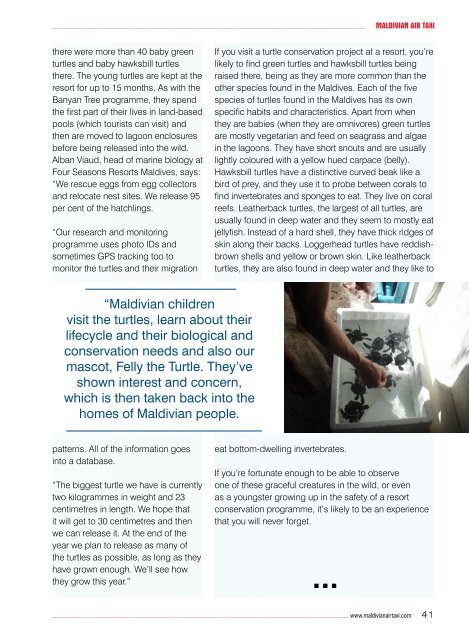You also want an ePaper? Increase the reach of your titles
YUMPU automatically turns print PDFs into web optimized ePapers that Google loves.
...................................................................................................................................................................................................................................................................................................................<br />
there were more than 40 baby green<br />
turtles and baby hawksbill turtles<br />
there. The young turtles are kept at the<br />
resort for up to 15 months. As with the<br />
Banyan Tree programme, they spend<br />
the first part of their lives in land-based<br />
pools (which tourists can visit) and<br />
then are moved to lagoon enclosures<br />
before being released into the wild.<br />
Alban Viaud, head of marine biology at<br />
Four Seasons Resorts Maldives, says:<br />
“We rescue eggs from egg collectors<br />
and relocate nest sites. We release 95<br />
per cent of the hatchlings.<br />
“Our research and monitoring<br />
programme uses photo IDs and<br />
sometimes GPS tracking too to<br />
monitor the turtles and their migration<br />
“<strong>Maldivian</strong> children<br />
visit the turtles, learn about their<br />
lifecycle and their biological and<br />
conservation needs and also our<br />
mascot, Felly the Turtle. They’ve<br />
shown interest and concern,<br />
which is then taken back into the<br />
homes of <strong>Maldivian</strong> people.<br />
patterns. All of the information goes<br />
into a database.<br />
“The biggest turtle we have is currently<br />
two kilogrammes in weight and 23<br />
centimetres in length. We hope that<br />
it will get to 30 centimetres and then<br />
we can release it. At the end of the<br />
year we plan to release as many of<br />
the turtles as possible, as long as they<br />
have grown enough. We’ll see how<br />
they grow this year.”<br />
MALDIVIAN AIR TAXI<br />
If you visit a turtle conservation project at a resort, you’re<br />
likely to find green turtles and hawksbill turtles being<br />
raised there, being as they are more common than the<br />
other species found in the Maldives. Each of the five<br />
species of turtles found in the Maldives has its own<br />
specific habits and characteristics. Apart from when<br />
they are babies (when they are omnivores) green turtles<br />
are mostly vegetarian and feed on seagrass and algae<br />
in the lagoons. They have short snouts and are usually<br />
lightly coloured with a yellow hued carpace (belly).<br />
Hawksbill turtles have a distinctive curved beak like a<br />
bird of prey, and they use it to probe between corals to<br />
find invertebrates and sponges to eat. They live on coral<br />
reefs. Leatherback turtles, the largest of all turtles, are<br />
usually found in deep water and they seem to mostly eat<br />
jellyfish. Instead of a hard shell, they have thick ridges of<br />
skin along their backs. Loggerhead turtles have reddishbrown<br />
shells and yellow or brown skin. Like leatherback<br />
turtles, they are also found in deep water and they like to<br />
eat bottom-dwelling invertebrates.<br />
If you’re fortunate enough to be able to observe<br />
one of these graceful creatures in the wild, or even<br />
as a youngster growing up in the safety of a resort<br />
conservation programme, it’s likely to be an experience<br />
that you will never forget.<br />
................................................................................................................................................................................................................................................................................................... www.maldivianairtaxi.com 41


